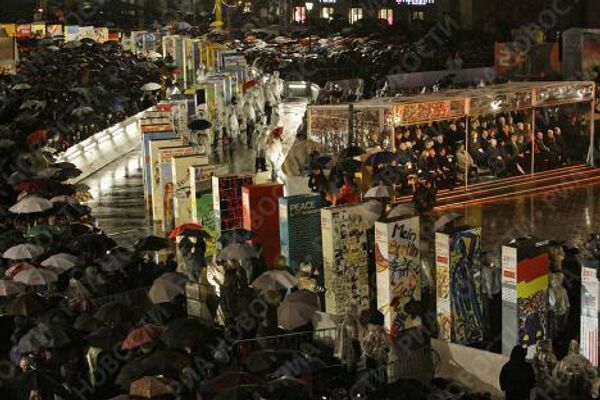MOSCOW. (RIA Novosti political analyst Andrei Fedyashin) - Greater Europe celebrated the 20th anniversary since the fall of the Berlin Wall, and then immediately started dealing with practical issues, including the growing discord and dissension over the imminent bureaucratic reorganization in Brussels. The fallen wall may have united Germany, but the European Union, which had to pick up the pieces, which in this case means the Eastern and Central European countries, has not grown any closer because of it.
These Eastern and Central European counties turned out to be more demanding than they seemed and more presumptuous than was thought. And they proved adept at getting on the nerves of the older members of the EU. A prime example is Czech President Vaclav Klaus, who signed the Lisbon Treaty, which had long been ratified, only on November 3. Now Europe will have to prepare for the treaty's coming into effect more quickly than it would have liked.
The first tense consultations to select candidates for the top posts in the revamped European Union began immediately following the banquet in Berlin on November 9. A new European Council President-in-Office and a new High Representative of the Union for Foreign Affairs and Security Policy must be appointed.
Bureaucratic and national tensions have always risen to the surface during the selection of EC commissioners, and now a leader of the entire EU must be selected. So there is more tension than ever before, and the range of opinions of candidates turned out to be so wide that it has thoroughly undermined the groundwork laid by the two most important EU states - France and Germany.
It is always like this - the blessings of Paris and Berlin are needed for a candidate to assume any major post. But now new names have been added the list of candidates, and those whom Paris and Berlin thought were shoo-ins have been moved down on the list of candidates, and it is now unclear whether they will be selected. This is exactly what happened with the candidacy of former British Prime Minister Tony Blair, who as recently as a month ago seemed guaranteed to receive the presidential post. All for naught.
No one in Brussels will be indifferent to the accent the members of the new executive branch of Greater Europe will speak with while Greater Europe is being brought in line with the Lisbon reform agreement. The president of the Czech Republic finally signed said agreement on November 3, and now Brussels will have to be reformed as early as December 1, after a delay of exactly one year.
Blair wanted (and still wants) to become the EU president so much that he was ready to give up his sizable earnings. After leaving the post of prime minister in 2007, he became a consultant for the American bank JP Morgan (where he earned about two million pounds sterling per year), and a consultant to an investment company in Zurich (another two million pounds per year). He also earns money on the lecture circuit, where he charges $200,000 per appearance. His earnings for last year were 12 million pounds. In the EU, he would be paid almost ten times less.
The day before the celebrations in Berlin, he phoned all of the major players in the EU, including French President Nicolas Sarkozy and German Chancellor Angela Merkel. The results of these phone conversations remain unclear, although other things came to the surface.
Strange as it may seem, Blair may be sidelined by his comrade from the Labour Party, British Foreign Minister David Miliband, one of Britain's most ambitious politicians. Miliband unexpectedly arrived in Berlin for the festivities, after cancelling all of his engagements at home, and met with EU leaders. He is being groomed for the post of EU foreign minister. According to EU conventions, the two top posts in Brussels cannot be occupied by à) two people from the same country and b) two people from the same or similar political movement. So either Tony Blair or David Miliband will be excluded.
These purely bureaucratic games within the EU have major significance for Russia. Russia would, of course, prefer a combination of Tony Blair with somebody else. Anyone but Miliband. He has very complicated relations with Russia in general and with Russian Foreign Minister Sergei Lavrov in particular.
At present, European bookmakers favor Belgian Prime Minister Herman van Rompuy as president and David Miliband as foreign minister. The names of Dutch Prime Minister Jan Peter Balkenende and former Italian Prime Minister Massimo D'Alema are also being mentioned more and more frequently. Other possible candidates include Luxembourg's Prime Minster Jean-Claude Juncker and former Finnish Prime Minister Paavo Lipponen.
The opinions expressed in this article are the author's and do not necessarily represent those of RIA Novosti.

